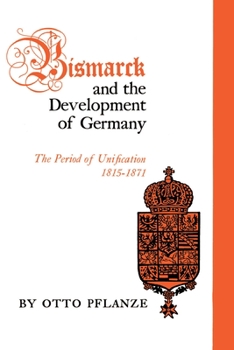Bismarck and the Development of Germany: The Period of Unification, 1815-1871
(Book #1 in the Bismarck and the Development of Germany Series)
Select Format
Select Condition 
Book Overview
This political history of Germany assesses Bismarck's role in the events which paved the way for the catastrophes of the twentieth century, showing how Bismarck first established the association between German nationalism, Prussian militarism, and Hohenzollern authoritarianism. The author is completing a second volume, "The Period of Consolidation, 1871-1890." Volume I has been awarded the McKnight Foundation Humanities Award.
Format:Paperback
Language:English
ISBN:0691007659
ISBN13:9780691007656
Release Date:November 1971
Publisher:Princeton University Press
Length:526 Pages
Weight:1.50 lbs.
Dimensions:1.3" x 6.1" x 9.1"
Customer Reviews
1 rating
How Bismarck Unified Germany through Cunning
Published by Thriftbooks.com User , 22 years ago
Otto Pflanze's book describes how Bismarck manipulated domestic and international politics to unify Germany.This book, ending in 1871 at the end of the first phase of Bismarck's career is the first of three volumes. The book begins by showing how idealists and romantics tried and failed to unite Germany, but Bismarck was a realist and based his methods on the strengths and weaknesses of individuals.First Bismarck used cunning diplomacy to isolate the Austria, Prussia's rival for control of the German states. The Franco Austrian war demonstrated Austria's weakness, and increased worries among northern Germans about French strength. This improved Prussia's hand, and later Bismarck's hand. Pflanze follows Bismarck's tactics step by step through his labyrinthine maneuvers as he played France against Austria during the Schleswig Holstein situation Bismarck wanted to separate Austria from the German confederation and inspire the northern German states to unite into a Northern German confederation. After Bismarck unified northern Germany he designed the constitution to allow him to play the Reichstag against the Prussian chamber of deputies. There was also a balance of power between the state and confederate governments. We also see domestic political and economic background to Bismarck's actions. Pflanze shows the domestic politics after Bismarck created the northern German confederation.Bismarck used relations with France to make advances toward the southern German states. Pflanze carefully shows how Bismarck cleverly tried to use the Luxemburg crisis to woo the southern German states. But the southern German states were afraid of being overwhelmed by Prussia. The only thing that the southern German states admired about the northern German confederation was the Prussian military expertise. Relations between France and Prussia worsened when the throne of Spain was offered to a Hohenzollern Kaiser William did not care if any of his relatives got the Spanish throne or not. But when Bismarck made it seem that the French had demanded that Kaiser William renounce any attention in the Spanish throne, he angrily refused. The nationalist French responded by declaring war.Bismarck wanted a war with France to inspire the southern Germans to join the northern confederation against the threat of France. In this he succeeded. But nationalist anger of many, and political reasons of Bismarck caused Germany to annex Alsace Lorraine, which resulted in permanent hatred from France.The only faults of this book are that Pflanze should have described the people more. He also should have included more maps and a bibliography.





